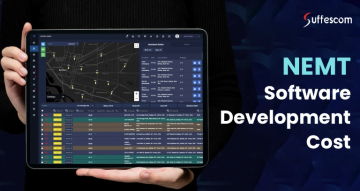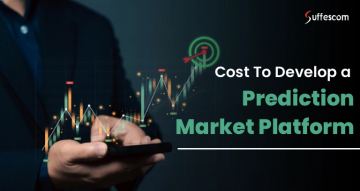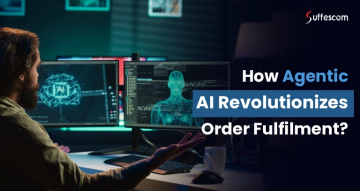The Rise of AI in Retail: Use Cases, Trends, and Impact

The digital transformation of the retail industry has been going on for years. It has increased speed, efficiency, and accuracy across every branch of retail business, largely thanks to advanced data and predictive analytics systems that are helping companies make data-driven business decisions.
AI in the retail industry enables going beyond traditional transactions and delivering highly personalized customer experiences throughout a seamless shopping journey. The global artificial intelligence (AI) in retail market was valued at USD 11.83 billion in 2024 and is expected to reach approximately USD 62.64 billion by 2034.

From streamlining supply chains to delivering personalized shopping experiences, AI is no longer a futuristic concept—it's a game-changer that's already transforming how retail businesses operate. With technologies like machine learning, computer vision, and natural language processing, retailers now have powerful tools to optimize operations, enhance customer service, and stay ahead in an increasingly competitive market. As consumer expectations rise, AI is essential for creating smarter, faster, and more personalized retail experiences.
How AI In Retail Works?
AI in retail collects and analyzes large volumes of data, such as customer behavior, purchase history, inventory levels, and market trends, to generate real-time insights and automate decision-making. Technologies like machine learning, computer vision, and natural language processing power applications such as personalized product recommendations, dynamic pricing, chatbots, and demand forecasting. By integrating AI into various online and in—store touchpoints, retailers can streamline operations, enhance customer experiences, and make data-driven decisions that boost profitability and efficiency.
This architecture simplifies retail management by unifying different elements to improve data analysis and inform decision-making. Here's a step-by-step overview of its operation:
Explore AI Solutions for Your Retail Business
Ready to transform your retail operations with cutting-edge AI? From predictive analytics and dynamic pricing to personalized customer journeys and inventory optimization, our AI solutions are tailored to elevate your retail performance.
Benefits of AI in Retail
Personalized Customer Experiences
AI analyzes customer data and behavior to deliver personalized product recommendations, targeted marketing messages, and customized shopping experiences, increasing conversion rates and customer satisfaction. The use of AI in retail allows for hyper-personalization that was once impossible with traditional methods.
Efficient Inventory Management
AI-powered systems predict demand trends, optimize stock levels, and prevent overstocking or stockouts. This leads to cost savings and ensures popular items are always available, making AI in retail business a critical asset for inventory optimization.
Enhanced Customer Service
AI chatbots and virtual assistants provide instant customer support 24/7, answering queries, tracking orders, and handling returns, thus improving service efficiency and customer loyalty.
Improved Supply Chain Operations
AI enhances logistics by forecasting demand, suggesting efficient delivery routes, and streamlining warehouse operations, resulting in faster delivery times and reduced costs.
Dynamic Pricing Strategies
AI tools assess market conditions, competitor pricing, and customer behavior to implement real-time pricing adjustments, maximizing profits and competitiveness.
Customer Sentiment Analysis
AI analyzes customer reviews, social media interactions, and feedback to understand customer sentiment, helping retailers improve products and services.
Visual Search and Smart Shopping
AI enables features like visual search, where users can upload images to find similar products. This makes the shopping experience more intuitive and engaging, and is an innovation transforming AI in the retail and e-commerce space.
Workforce Optimization
AI helps in scheduling, task management, and performance analysis of retail staff, ensuring efficient operations and better customer service.
Marketing and Sales Automation
AI automates email campaigns, social media ads, and customer segmentation, enabling more effective and data-driven marketing strategies. As the AI in retail market continues to grow, these tools become essential for competitive advantage.
Real-World Use Cases of AI in Retail
1. Personalized Recommendations in Retail
Personalized recommendations are among the most visible and practical applications of AI in retail. By analyzing vast amounts of data, such as customer behavior, browsing history, purchase patterns, demographic information, and even time spent on particular pages, AI-powered engines can predict what a customer is most likely to buy next.
These insights help retailers deliver real-time hyper-relevant suggestions across multiple channels—websites, apps, emails, and in-store displays. For example, if a customer frequently buys fitness gear and protein supplements, the system may recommend new workout equipment or diet plans tailored to that interest.
Retail giants like Amazon, Netflix, and Walmart have set benchmarks in this area. Amazon's recommendation engine is responsible for up to 35% of its total sales, driven by intelligent algorithms that analyze user preferences and market trends.
In addition to boosting conversions and average order value, personalized recommendations enhance customer satisfaction and loyalty, as shoppers feel understood and valued.
Expert Opinion – "Personalized AI engines are revolutionizing how we engage customers. Our tailored recommendations have increased user engagement by 28%." – Lena Rodriguez, Chief Digital Officer, TrendBuy Retail
2. Inventory Management
Inventory is one of the most critical and complex components in retail. Traditional methods often lead to overstocking or stockouts, harming revenue and customer trust. AI offers a more innovative approach.
Machine learning algorithms use predictive analytics to forecast product demand with high accuracy. These models consider various factors such as:
- Seasonal trends
- Consumer buying patterns
- Geographic and demographic data
- External influences (e.g., weather, events, economic changes)
AI can also automate reordering processes, suggesting optimal stock levels and notifying supply chain teams when items need replenishing. Some advanced systems even integrate IoT sensors and RFID tags to monitor stock in real-time across warehouses and stores.
The result is a leaner, more efficient inventory, reduced carrying costs, and fewer lost sales due to out-of-stock items.
Expert Opinion - "We hired AI developers to build AI software for demand forecasting, which reduced our stockouts by 40%. AI in retail is not about replacing humans—it's about augmenting teams with smarter tools." - Mark Gallagher – CTO, UrbanMart Omni-Channel Retail
3. Customer Service and Chatbots
In today's digital-first world, customers expect instant and seamless support. AI-powered chatbots and virtual assistants fulfill this need by providing 24/7 automated customer service.
These bots are equipped with Natural Language Processing (NLP) capabilities, allowing them to understand and respond to various customer queries, whether tracking an order, checking return policies, or recommending a product.
Unlike traditional support channels, AI chatbots can handle thousands of queries simultaneously with consistent quality and tone. This drastically reduces wait times, increases resolution speed, and lowers operational costs.
Companies like Sephora, H&M, and Domino's use AI chatbots to engage users through websites, mobile apps, and social media platforms. Some advanced systems can escalate complex issues to human agents, ensuring a hybrid support model that balances automation with human empathy.
Expert Opinion – “Since integrating AI chatbots, our first-response time has dropped by 85%, and customer satisfaction scores are at an all-time high." – Nina Patel, Head of Customer Experience, StyleHive
4. Visual Search and Augmented Reality (AR)
Visual search enables customers to search using images instead of text. This is particularly useful in fashion, home décor, and accessories, where consumers often want to find an item they've seen on social media, in real life, or a magazine.
AI-driven image recognition scans the uploaded photo and identifies visually similar products in the retailer's catalog. Retailers like ASOS, IKEA, and Zara have already integrated visual search into their apps, enabling a frictionless product discovery experience.
Combined with Augmented Reality (AR), this technology takes personalization even further. Customers can "try on" products virtually—sunglasses, a new lipstick shade, or a couch in their living room. This capability reduces return rates, boosts confidence in purchase decisions, and creates an engaging, tech-forward shopping journey.
Expert Opinion – "Our AR tool led to a 25% increase in conversion rates and a 35% drop in returns. It's become a vital part of our digital strategy." – Carlos Menendez, Director of Digital Innovation, HomeVibe
5. Dynamic Pricing
Pricing in retail has traditionally been static or manually adjusted. With AI, retailers can implement dynamic pricing models that automatically adapt based on:
- Real-time demand and supply
- Competitor pricing
- Customer purchase history and behavior
- Market trends and seasonality
- Inventory levels
This allows businesses to offer competitive yet profitable pricing, maximizing margins without losing customers. For example, if demand for a product spikes unexpectedly, AI can instantly raise the price while maintaining sales volume. Conversely, discounts can be triggered to increase turnover if a product is underperforming.
This pricing flexibility is crucial in e-commerce and omnichannel retail, where prices must stay agile to stay relevant.
Expert Opinion – "Dynamic pricing helped us increase profit margins by 18% in just one quarter without losing customer trust." – Rebecca Chang, VP of Pricing Strategy, DealNova
6. Fraud Detection and Security
Retailers face increasing threats from fraudulent activities, including unauthorized transactions, fake returns, identity theft, and payment fraud. AI helps mitigate these risks by continuously monitoring transactions for anomalies and suspicious patterns.
Using machine learning models trained on historical data, AI systems can:
- Flag high-risk transactions in real time
- Detect inconsistencies in customer behavior
- Identify account takeovers or synthetic fraud
- Predict potential chargebacks or return abuse.
For instance, if a user suddenly changes their location, device, and purchase behavior, the system may trigger a verification process or temporarily block the transaction.
Retailers like Target, Best Buy, and eBay leverage AI for proactive fraud detection, significantly reducing losses while maintaining a smooth customer experience for legitimate users.
Expert Opinion – "AI-driven fraud detection has helped us cut fraudulent transactions by over 60% while keeping legitimate customer journeys friction-free." – James O'Reilly, Chief Risk Officer, SecureCart Solutions
Emerging Trends in AI for Retail and E-commerce
Hyper-Personalization
Retailers are moving beyond basic recommendation engines to deliver deeply personalized marketing messages, promotions, and in-store experiences based on individual preferences and behaviors. These strategies are among the most impactful AI in retail examples, demonstrating how advanced data analytics and machine learning can enhance customer engagement on a one-to-one level.
AI-Driven Supply Chains
Predictive analytics, robotics, and IoT sensors are integrated with AI to create agile, responsive, cost-effective supply chains. These retail AI solutions streamline logistics, reduce delays, and ensure inventory accuracy across channels, improving efficiency and customer satisfaction.
Voice Commerce
With the rise of smart speakers, voice-assisted shopping is becoming increasingly popular. AI enables natural language processing to facilitate seamless shopping experiences via voice commands, providing another layer of convenience and innovation within modern AI in retail examples.
Autonomous Stores
AI-powered checkout-free stores like Amazon Go are changing the retail landscape. These stores use computer vision and sensors to allow customers to shop without traditional checkouts. They serve as real-world AI in retail examples that showcase the potential of automation in enhancing operational efficiency.
Sustainability Through AI
Retailers leverage AI to optimize energy use, reduce waste, and make eco-conscious supply chain decisions. Such retail AI solutions drive cost savings and support corporate sustainability goals and environmentally responsible retail practices.
The Impact of AI on the Retail Ecosystem
AI has far-reaching implications for all aspects of the retail ecosystem:
- Customer Experience: AI delivers seamless, intuitive, and engaging shopping experiences, both online and in-store.
- Operational Efficiency: Automation reduces manual tasks and enhances productivity, leading to cost savings and faster time-to-market.
- Data-Driven Decision-Making: Retailers can harness vast amounts of customer and operational data to make informed, strategic decisions.
- Workforce Transformation: While AI automates routine tasks, it also opens up new roles centered around technology management, data analysis, and digital strategy.
Challenges and Considerations While Implementing AI in the Retail
Despite its advantages, adopting AI in retail comes with challenges that can be addressed accordingly:
- Data Privacy and Ethics: It is critical to handle customer data responsibly and transparently. Misuse or breaches can damage trust and lead to legal consequences.
- Integration Complexity: Merging AI systems with legacy infrastructure can be complex and costly.
- Talent Shortage: The demand for skilled AI professionals often outpaces supply, making it difficult for retailers to build and maintain AI-driven systems.
- Bias in Algorithms: If not properly trained, AI systems can reflect and perpetuate biases, leading to unfair or inaccurate outcomes.
The Future of AI in Retail
The future of AI in retail is brimming with potential. As AI technologies become more accessible and affordable, even small and mid-sized retailers will leverage them to remain competitive. The focus will shift toward creating immersive and intelligent retail environments powered by real-time data, predictive analytics, and automation. Additionally, ethical AI practices and customer trust will become key differentiators in the marketplace.
1. Wider Accessibility & Adoption
AI is becoming more affordable, allowing small and mid-sized retailers to adopt innovative solutions and compete with larger players.
2. Intelligent, Connected Retail Ecosystems
Retail will move toward integrated systems where AI connects online, offline, and backend data to create seamless experiences.
3. Real-Time Personalization & Automation
AI will deliver instant, personalized recommendations and automate tasks like inventory, reordering, and customer support.
4. Predictive Analytics for Smarter Decisions
Retailers will use AI to forecast demand, optimize pricing, and plan more effectively based on data-driven insights.
5. Generative AI in Marketing & Design
AI will help create product descriptions, design ideas, and personalized content, saving time and enhancing creativity.
6. Ethical AI & Data Privacy
Transparency and ethical AI use will become crucial as consumers demand secure and fair data handling.
7. Enhanced Customer Experiences
AI will power features like virtual try-ons, visual search, and cashier-less stores to offer more engaging shopping journeys.
8. Human-AI Collaboration
AI will assist—not replace—humans! It will handle routine tasks and provide insights, allowing teams to focus on customer service and strategy.
Unlock Your Business Potential with End-to-End AI Solutions
Don't let outdated systems hold your business back. Leverage our end-to-end AI services to boost efficiency, reduce costs, and deliver personalized experiences that drive loyalty and sales.
Conclusion
AI is not just a technological upgrade but a strategic enabler for the retail sector. From enhancing customer experiences to streamlining operations and embracing future-forward innovations, AI is reshaping how retail functions. As the industry evolves, partnering with a trusted AI development company will be crucial for retailers aiming to implement intelligent solutions and thrive in the digital era through responsible and strategic adoption of AI.
FAQs
1. How does AI in retail work?
AI in retail refers to using artificial intelligence technologies like machine learning, computer vision, and natural language processing to optimize operations, personalize customer experiences, and enhance decision-making. AI integration services allow businesses to analyze data such as customer behavior, sales trends, and inventory levels to automate and improve various aspects of retail.
2. What are the main benefits of using AI in the retail industry?
Many top AI development companies offer solutions tailored to these benefits. Key AI use cases in retail include:
- Personalized shopping experiences
- Efficient inventory management
- 24/7 customer support via chatbots
- Dynamic pricing
- Fraud detection and prevention
- Improved supply chain operations
3. How can AI help with inventory management?
AI uses predictive analytics to forecast demand, track real-time stock levels, and automate reordering. Businesses that build AI software for retail can achieve better stock optimization, reduce waste, and improve customer satisfaction.
4. Are AI chatbots better than traditional customer service methods?
Yes. AI chatbots, often developed by an experienced AI development company, can handle thousands of queries simultaneously, reduce response times, and provide 24/7 support, drastically improving service quality and reducing costs.
5. What is visual search in retail, and how does it work?
Visual search lets customers upload images to find similar products. A custom AI model processes the image using computer vision and matches it with catalog items, creating a seamless, engaging shopping experience.
6. How much does it cost to implement AI in retail?
AI cost depends on the scope. For advanced, custom AI solutions, prices typically range from $10,000 to $20,000, based on features, scale, and integration needs. It’s best to consult AI integration services or hire AI developers to get an accurate estimate.
7. How can I start using AI in my retail business?
Begin with an AI MVP (Minimum Viable Product) to test specific use cases like chatbots or demand forecasting. Partnering with top AI development companies can ensure scalable and cost-effective deployment.
8. Where can I hire AI developers for retail projects?
You can hire AI developers from specialized AI development companies that offer end-to-end services, including strategy, AI MVP development, and full-scale integration tailored for retail businesses.








